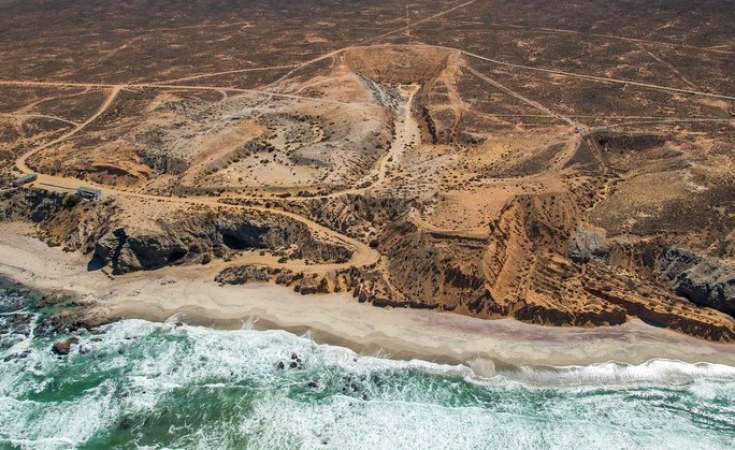A major legal battle over the extension of 30-year mining rights has been averted
- An out-of-court agreement was reached just hours before a major legal battle over mining on the West Coast was to begin.
- In dispute was the extension without consultation of 30-year diamond mining rights originally granted in the 1990s.
- The settlement will ensure that future diamond mining operations comply with approved and up-to-date Environmental Management Plans.
- But the legitimacy of the government's controversial awarding of 30-year extensions to mining rights without any public participation or notification remains unchallenged for now.
An 11th-hour settlement agreement negotiated between a West Coast diamond mining company and local small-scale fishing communities and environmentalists has narrowly averted what was set to be long and very expensive High Court litigation.
The settlement agreement, made an order of court in the Western Cape High Court this week, has confirmed that crucial conservation areas on the West Coast - particularly the Olifants River estuary and several other small areas of important biodiversity - will not be subjected in the future to diamond mining by Trans Hex Operations, the main respondent in this litigation.
The agreement also ensures that the company's future operations will be conducted in terms of updated environmental management programmes (EMPs), and that the specific interests of Doringbaai and Olifants River small-scale fishing communities (two of the applicants) will be addressed in a specialist study that will form part of these updated EMPs.
However, the agreement has ended the application for an interdict halting diamond mining operations pending legal considerations about the mining rights involved. This means that the legitimacy of the government's controversial awarding of 30-year extensions to mining rights without any public participation or notification remains unchallenged for now.
Ten such rights, originally awarded in the 1990s, are held by Trans Hex Operations, and the legitimacy challenge to these rights had formed a major part of the court application by environmental non-profit group Protect The West Coast (the first applicant) and two local small-scale fishing groups and two individual fishers.
The settlement terms
Major points in the settlement agreement include:
- Trans Hex and its contractors are prohibited from any beach, inshore or vessel mining, or related activities, for a 2.8km stretch of coast at the Olifants River estuary.
- No beach or inshore mining will occur in three other conservation-worthy areas: an 11km stretch of coast from the Olifants River mouth to south of Strandfontein village, and two beach sections to the north of the river.
- Trans Hex will - "as far as reasonably practical" - within six months apply to the Department of Mineral Resources and Energy (DMRE) to upgrade, amend and consolidate existing and approved EMPs, dating from 2003, for its three sea-based West Coast diamond mining concessions that include corresponding surf zone concessions and admiralty (beach) strips.
- If this EMP application is successful, the applicants, affected communities, BirdLife South Africa conservation group, and the two local municipalities can comment on and make recommendations "which shall be taken into account" in the approval process.
- The upgraded EMP will assess the cumulative impacts of Trans Hex's operations, as well as any potential impacts of such operations on climate change.
- The company's diamond mining operations will be subject to as many as four annual inspections by representatives of the applicants.
- Through specialist studies, other potential "no go" areas for mining in the region of the Olifants River estuary will be assessed.
- Trans Hex must separately identify the impacts and mitigation measures required for its vessel, shore-based and beach mining operations.
- The statutory requirements for mine closure plans and financing for such plans must be part of the revised EMP application.
- After submitting its application to the DMRE, Trans Hex must ensure that any public participation process required includes "meaningful and adequate" involvement by disadvantaged coastal communities, including the Doringbaai and Olifants River small-scale fishing communities (the second and third applicants).
Environmentalists welcome agreement
Protect the West Coast hailed the settlement agreement, saying "the future of one of South Africa's most biodiverse and fragile ecosystems, the fortunes of local fishermen, and tourism prospects has been secured".
But it also warned that the agreement was just one step towards ensuring properly regulated mining along the West Coast.
"While this outcome is certainly a victory, it is just one small battle won in the ongoing war against inadequately regulated mining in the region. There is still much work to be done and the fight against unlawful mining on the West Coast is far from over.
"But this victory has shown us what is possible in our mission to Protect The West Coast on behalf of its communities, and voiceless natural spaces, with flora and fauna," the group's managing director Mike Schlebach said in a statement.
In his reaction, chief executive officer of the Trans Hex Group Marco Wentzel said the settlement made it "quite clear" that the application had not achieved its principle aims, because his company's mining operations were continuing and its mining rights "remain in good standing".
"We believe the settlement arose out of a need for the Applicants to avoid an adverse judgment and costs order, hence the settlement terms that favour Trans Hex's continued operations."
The company had already started revising its environmental management programmes before the case started, and it would now refocus its attention on completing this process within the time-frames prescribed in the court order, Wentzel added in his statement.
"Trans Hex maintains that its operations were and continue to be lawful and, more importantly, continue to benefit the local community and contractors in an area with sparse economic activity and job opportunities."


